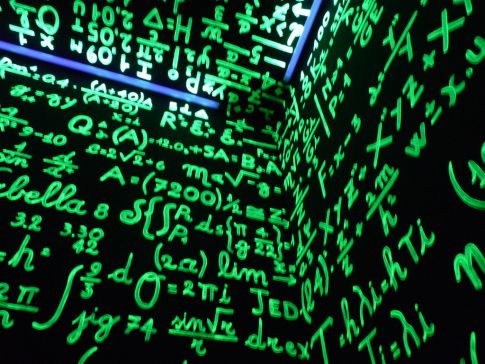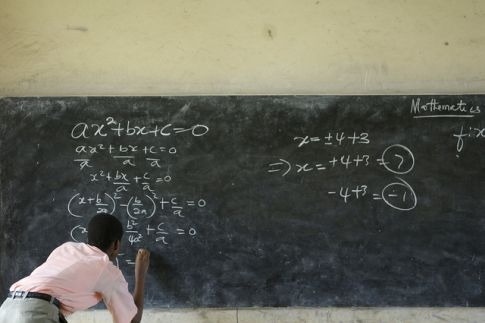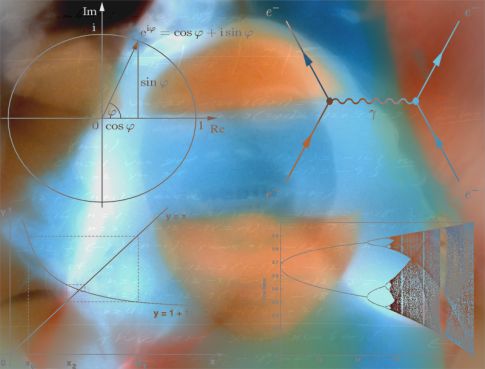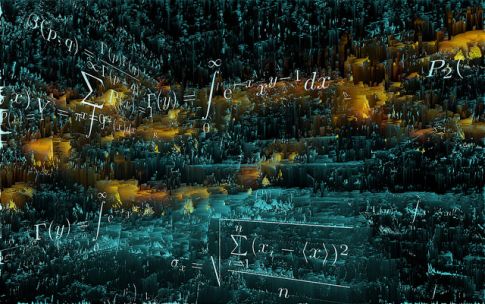Here's Eugene Wigner, from "Unreasonable Effectiveness":
"The first point is that the enormous usefulness of mathematics in the natural sciences is something bordering on the mysterious and that there is no rational explanation for it."

JoaoTrindale
I want to make a casual suggestion here, but one about which I am serious. What follows, in other words, is not meant to sound flippant.
Might the famous unreasonable effectiveness of mathematics--its spectacular success in quantifying, model-building and predicting future states of natural systems--be simply a matter of coincidence?
We tend to be amazed that math works again and again. Wigner compares the situation to a man with a bunch of keys finding that the first one or two he chooses always open the door. This would indeed be surprising, but the analogy can be read another way: how many ways are there to get into the house? The keys don't open windows; they don't open walls; they don't open the ceiling, or the yard, driveways or bushes or clouds. Keys fit those things that, well, fit keys. To note that one of your keys can do any task at all would be one thing. To keep being amazed that keys unlock doors is quite different.
Let's say a single key turns out to open a huge number of doors in Eugene's house--perhaps even an infinite number. That is surely an awesome thing, especially to a human mind: What a powerful key! Look at how many tasks it can handle--door upon door upon door!
But it still tells us nothing about what we aren't able to do with it (paint the house, grow the garden). Opening yet another door, excellent as that achievement may be--from the first discoveries in fluid mechanics to the latest in quantum chemistry--is, from the point of view of math's mysterious utility, essentially the same feat as it was the last time around. Look at that! Quantifiable things are still able to be quantified. Who knew?

WorldBankPhotoCollective
But even if endless discoveries are made using the abstraction of mathematical tools, we are not justified in assuming that we are, in this manner, making all possible discoveries. Something can be infinite (say, the set of all mathematical expressions that correspond, in some suitable defined way, to nature) without being all-encompassing (say, if that set we just described turns out to be a subset of another, also infinite set, "the set of all truths about nature").
Let's take a different approach. Part of logical positivist epistemology--the "logical" part--regarded mathematical statements as truths that can be known precisely because they are, ultimately, tautological. The whole intimidating edifice (Russell's phrase for Hegel) of modern mathematics is, in this view, simply a restating, or at best a following out, of axioms. Seen in this way, the complexities of any branch of mathematics could, by a sufficiently comprehensive mind, be immediately surmised from its axioms. If you understand that A is B and B is C, you already understand that A is C; you may not have stopped to draw out the steps, but when presented with the claim A = C, no new calculation was required per se. You already "got" that.
Positivism took it on the chin, and nobody much credits it any more. I am one of the few holdouts. But just grant for the moment their claim that math is an exercise in symbolic logic, and that any mathematical formalism is a tautology whose conclusions are, in a real sense, implicit in its axioms. Imagine, now, an "axiom bundle" as the sharp tip of an enormous glacier of implications. If the premise embedded in the tip is true of anything at all in the real world--any recurrent pattern, any stable quantity--then so is the glacier.
Wigner looks at the glacier and says: Wow! Look at all the things in nature that are mathematical! I'm saying: What you actually mean is that the axiom tip happened to correspond to at least one kind of natural thing.
Is that such a wonder?

FredHasselman
To return to our first metaphor, if we poke Wigner's key all over the house, eventually we may find a lock, then be amazed that we have a key and nature has a lock. If all the locks in the house are versions of the first lock, of course, we shouldn't be surprised when the key keeps working; in a sense, we keep repeating the same procedure. But it doesn't follow that we are understanding all that much about the house.
I'm not suggesting--I hasten to clarify, here, at the end--that there are *supernatural* truths we may be missing with the key of naturalism. I'm suggesting that there may be *non-mathematically accessible natural truths.* And no, I don't know what such truths would look like, though I note that some other folks harbor similar suspicions. Stephen Wolfram, in A New Kind of Science, suggests that traditional formulae are inadequate to the task of understanding nature, and that something else is needed (in his view, it's the empirical study of cellular automata). Thomas Nagel, whom I took to task here for his Mind and Cosmos, thinks consciousness itself cannot be explained using the default of materialism, which means there is at least one thing to nature that isn't reducible to mathematics (following the reductionist arrows from consciousness to neuroscience to biology to chemistry to physics to math, which is where, if you agree with Max, reality stops. By the way, Max, you owe me an email.).
I don't know how convinced I am by my own line of reasoning. (Here's a possible counterargument: Since all truths are logical--that is, even if Mother Nature throws dice, she does not act incoherently--then, if math really is symbolic logic, all truths are mathematical. QED.)
At least, though, what I've sketched out here is a logical possibility--and one that would explain that seemingly "unreasonable effectiveness" of Wigner's key as a tool for uncovering nature's secrets. It may just be a sampling error.

Torley